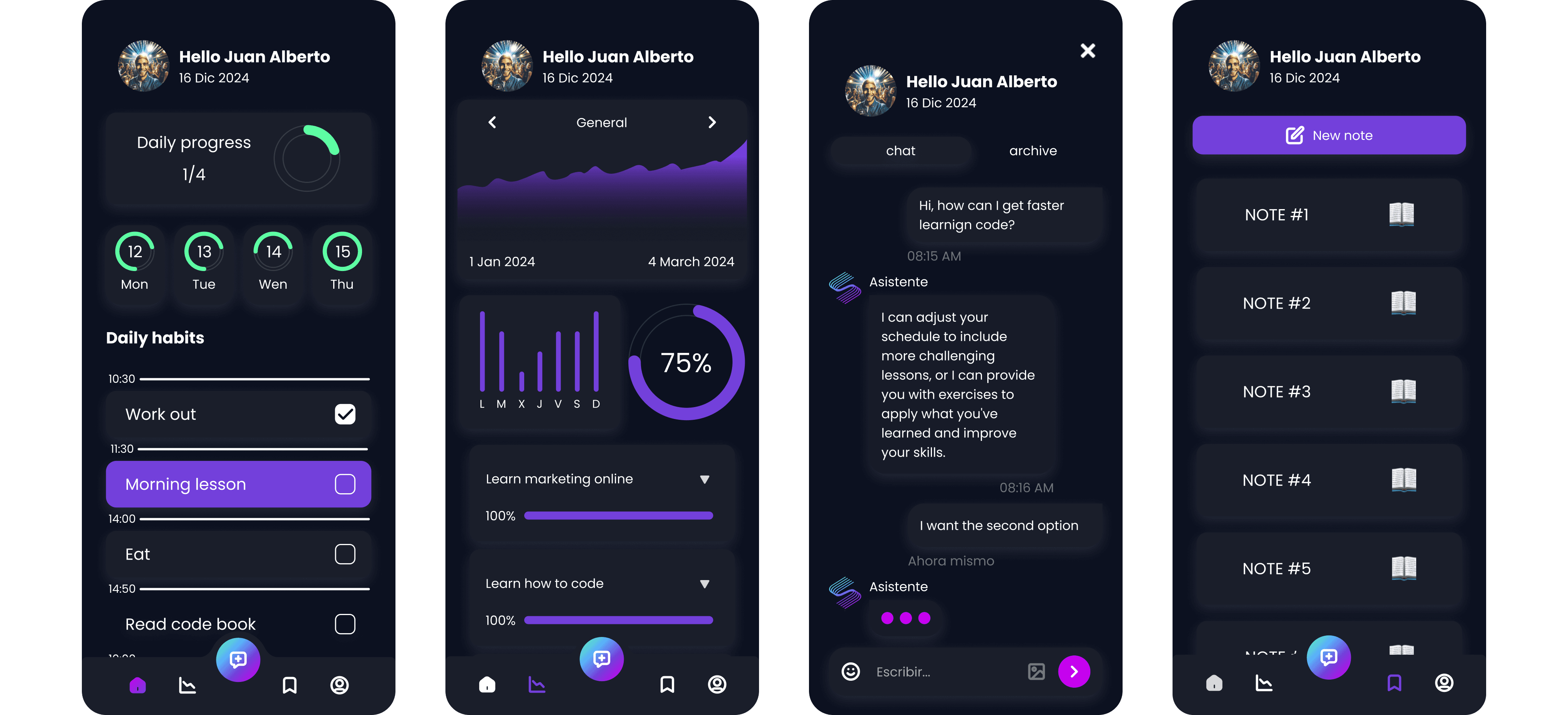Name project: Espectra smart mentoring
Role: Product Manager, UX/UI designer
Explanation
Product design
Ux/ui design
The product's goal is to offer an accessible personal development coach for those who cannot afford a human coach. It guides the user on their personal journey and gives them the ability to communicate with it at any time. It uses various functionalities to collect data about the user's condition and progress, thereby being able to act accordingly and offer the most personalized treatment possible.
Specific Features:
24/7 Virtual Coach: A chat feature capable of utilizing the user's historical data. This coach acts as a friend to the user, helping to solve problems and guide them in their personal development.
Habit Tracker: Useful for users to track their progress. This data also helps us internally to provide information to the virtual coach.
Journal: Allows users to reflect on their day, including highs and lows. This serves as a guide to structure the model's behavior at the moment and to guide them correctly.
Goal Planning and Tracking: A feature to set SMART goals (Specific, Measurable, Achievable, Relevant, Time-bound), plan steps to achieve them, and track progress.
Product exploration
I analyzed different apps in the same category and look their design patterns, analyze their site map and how their user flow works. conclusion, all apps provides a consistent way to remind your habits and show the progress to stick to them, they also have a detailed way to setting up habits.
Nav bar importance


The nav bar is very important for navigating the product. It's common to find the functionality for entries/check-in on the home page, along with the statistics. In the center, the most important functionality, sometimes highlighted to prompt the action of its use. Following, a screen for reminders and finally, settings.
Nav bar importance
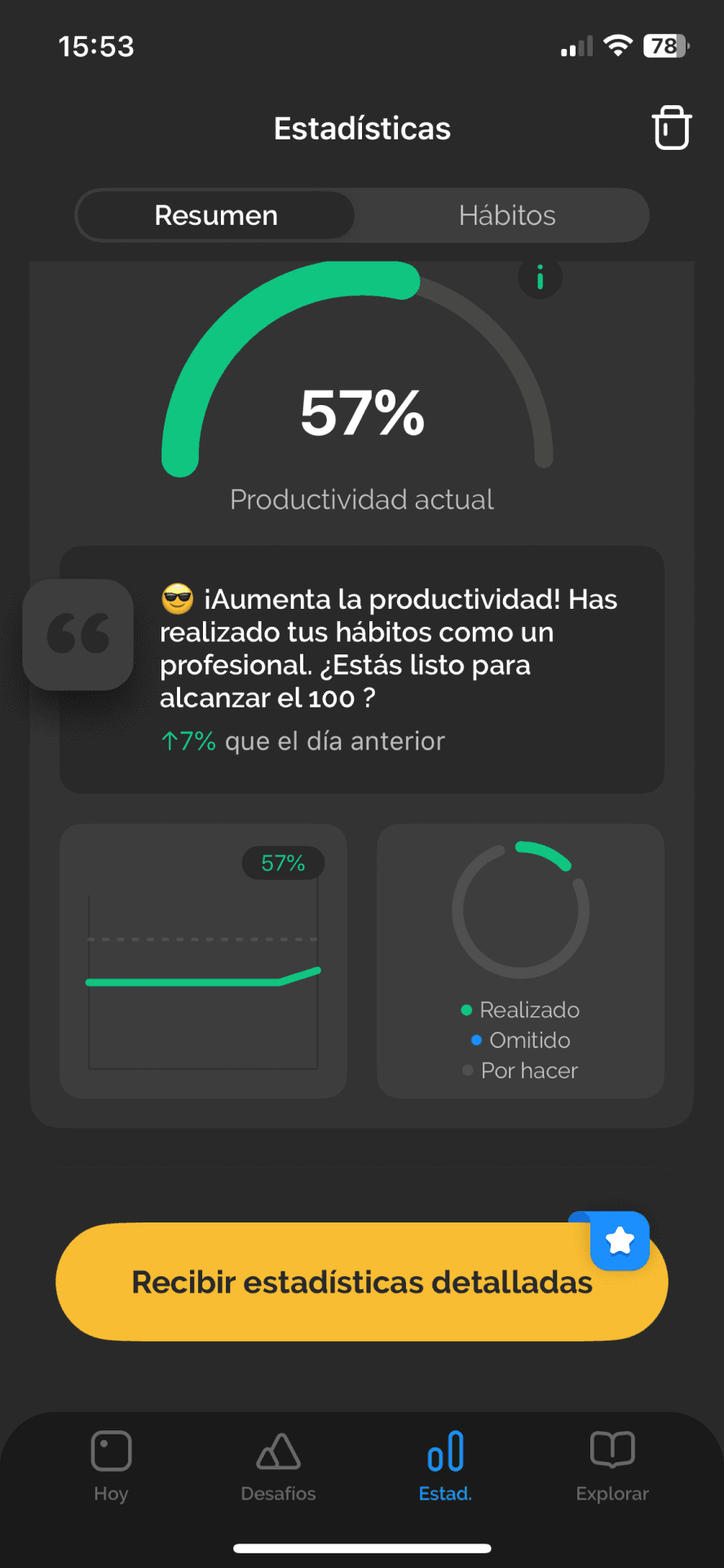
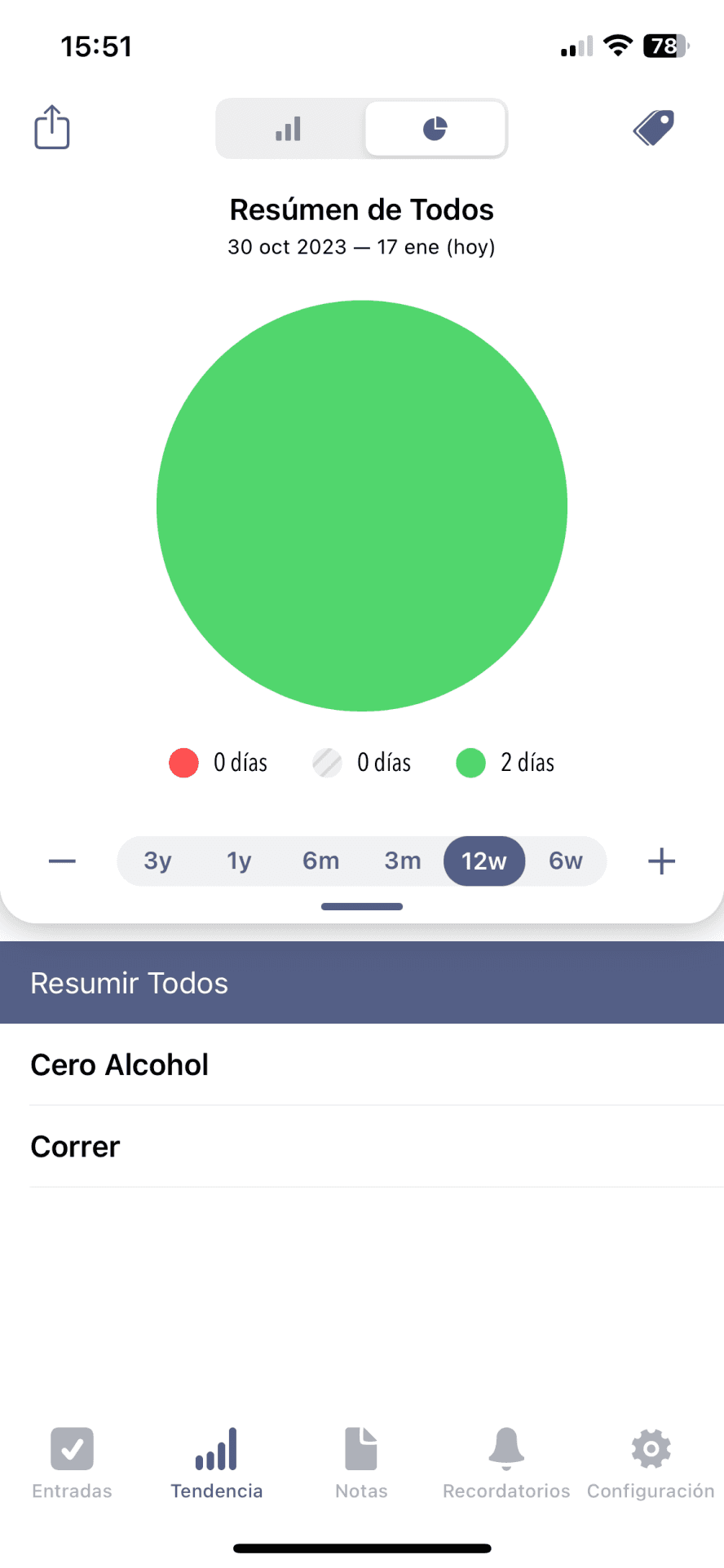
The statistics page is the most important factor in helping the user understand their progress. It's essential to show users the consistency of their habits and how they are achieving their goals clearly, as being able to see their progress motivates them to continue with it.
Common habit-tracking applications first show the total progress, followed by the option to see the individual progress of the goal.
They also have the option to add, delete, and edit already established habits, in addition to seeing the deadlines of the goals.
User persona
Alex Rivera: 28 years old, male, Junior Marketing Specialist with a Bachelor's degree in Marketing.
Location: Urban area, living in a shared apartment.
Tech-savvy: Depends on technology for both personal and professional tasks.
Demographics: Single, with an entry-level salary and budget-conscious.
Lifestyle: Has an active social life but struggles to balance work and personal life.
Goals:
Professional Development: Aims to become a marketing manager within the next 5 years.
Personal Growth: Wants to develop better health, productivity, and mindfulness habits.
Financial Stability: Seeks to better manage finances, save for future goals, and reduce unnecessary spending.
Challenges:
Time Management: Struggles to balance a demanding job, personal life, and self-improvement efforts.
Accountability: Finds it difficult to stay committed to personal goals and habits without external motivation.
Stress Management: Often feels overwhelmed by professional responsibilities and personal expectations.
Behavior:
Digital Native: Comfortable using apps and digital tools for various aspects of life, including banking and health.
Self-improvement Enthusiast: Actively seeks resources for personal growth, such as books, podcasts, and online courses.
Budget-conscious: Looks for affordable personal development solutions due to limited disposable income.
Needs:
A personalized, accessible coaching experience that fits within a tight budget.
A tool to track habits, progress towards personal and professional goals, and daily reflections to manage stress.
24/7 access to motivational and guidance resources to stay focused and accountable.
How the App Meets Alex's Needs:
Virtual Coach 24/7: Provides Alex with a constant companion and guide, accessible anytime for support, advice, and motivation without the high cost of a human coach.
Habit Tracker: Helps Alex monitor daily habits and progress in a user-friendly way, reinforcing positive behavior changes and providing insights for improvement.
Diary: Allows Alex to reflect on their day, track mood and experiences, and gain insights into patterns that affect personal growth and well-being.
Goal Planning and Tracking: Facilitates setting SMART goals and tracking progress, enabling Alex to stay on track with both personal and professional objectives.
Alex represents a segment of the app's target audience who seeks to improve their life through accessible, technology-driven solutions. This persona highlights the app's value proposition to users seeking personal development without the high costs typically associated with personal coaching.
Site map

User flow
In this article I want to focus from the onboarding to the home, because it is the most important part, since from the beginning of the application, the user must already have some guidelines to follow to start meeting their goals, in addition to the AI must be able to interpret the guidelines that have been provided, in terms of guidelines, we must be careful of the information we ask the user, since the information collected is what the AI will use to create the planning. We came to the conclusion that the necessary information to guarantee an understanding of the AI model and a good creation of the planning was extracted with the following key questions: "Explain what is your goal", "When do you want to achieve it?", "What is your daily free time" and "Have you ever tried to achieve this same goal/do you have any knowledge on the subject?

Complete user flow
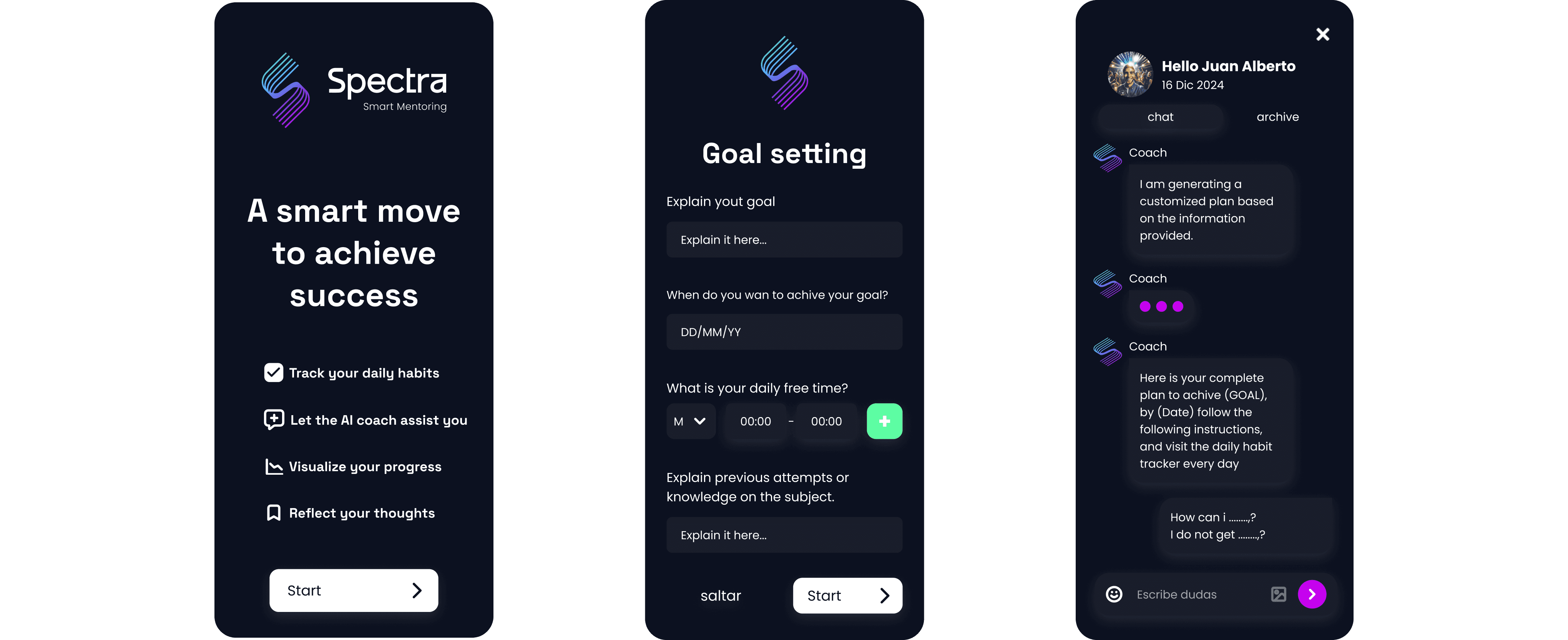
Wireframes
These are the first sketches we designed to understand how information is organized in this type of applications to ensure good usability by the users, as well as to facilitate their understanding of all the information they have to process.
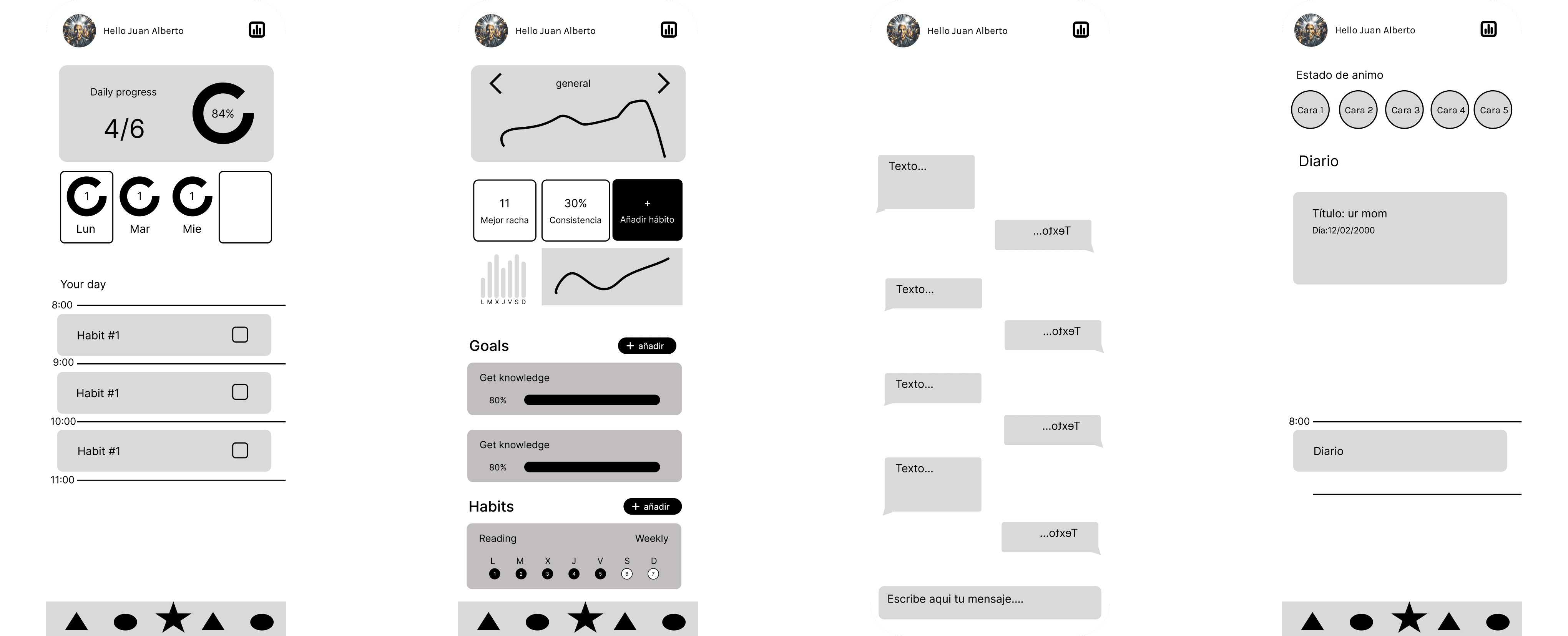
Design system
COLORS
HEX: 5DFDA3
RGB: 93 / 253 / 163
HEX: 58B5FD
RGB: 93 / 253 / 163
HEX: 7340DB
RGB: 93 / 253 / 163
HEX: C502EE
RGB: 93 / 253 / 163
GRADIENT 1
GRADIENT 2
GRADIENT FULL
HEX: D3EBFA
RGB: 211 / 235 / 250
HEX: 0C1120
RGB: 12 / 17 / 32
General
1 ENE 2024
4 MAR 2024
100%
75%
50%
25%
Aprender a programar
100%
Work out
Read
design
Martes, 23 Enero
Ok
Empieza a escribir





Complete Design system
Prototype
